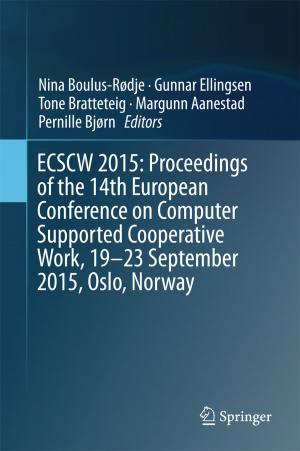E-Expertise: Modern Collective Intelligence
Nonfiction, Computers, Advanced Computing, Artificial Intelligence, General Computing| Author: | Dmitry Gubanov, Nikolai Korgin, Dmitry Novikov, Alexander Raikov | ISBN: | 9783319067704 |
| Publisher: | Springer International Publishing | Publication: | May 20, 2014 |
| Imprint: | Springer | Language: | English |
| Author: | Dmitry Gubanov, Nikolai Korgin, Dmitry Novikov, Alexander Raikov |
| ISBN: | 9783319067704 |
| Publisher: | Springer International Publishing |
| Publication: | May 20, 2014 |
| Imprint: | Springer |
| Language: | English |
This book focuses on organization and mechanisms of expert decision-making support using modern information and communication technologies, as well as information analysis and collective intelligence technologies (electronic expertise or simply e-expertise).
Chapter 1 (E-Expertise) discusses the role of e-expertise in decision-making processes. The procedures of e-expertise are classified, their benefits and shortcomings are identified and the efficiency conditions are considered.
Chapter 2 (Expert Technologies and Principles) provides a comprehensive overview of modern expert technologies. A special emphasis is placed on the specifics of e-expertise. Moreover, the authors study the feasibility and reasonability of employing well-known methods and approaches in e-expertise.
Chapter 3 (E-Expertise: Organization and Technologies) describes some examples of up-to-date technologies to perform e-expertise.
Chapter 4 (Trust Networks and Competence Networks) deals with the problems of expert finding and grouping by information and communication technologies.
Chapter 5 (Active Expertise) treats the problem of expertise stability against any strategic manipulation by experts or coordinators pursuing individual goals.
The book addresses a wide range of readers interested in management, decision-making and expert activity in political, economic, social and industrial spheres.
This book focuses on organization and mechanisms of expert decision-making support using modern information and communication technologies, as well as information analysis and collective intelligence technologies (electronic expertise or simply e-expertise).
Chapter 1 (E-Expertise) discusses the role of e-expertise in decision-making processes. The procedures of e-expertise are classified, their benefits and shortcomings are identified and the efficiency conditions are considered.
Chapter 2 (Expert Technologies and Principles) provides a comprehensive overview of modern expert technologies. A special emphasis is placed on the specifics of e-expertise. Moreover, the authors study the feasibility and reasonability of employing well-known methods and approaches in e-expertise.
Chapter 3 (E-Expertise: Organization and Technologies) describes some examples of up-to-date technologies to perform e-expertise.
Chapter 4 (Trust Networks and Competence Networks) deals with the problems of expert finding and grouping by information and communication technologies.
Chapter 5 (Active Expertise) treats the problem of expertise stability against any strategic manipulation by experts or coordinators pursuing individual goals.
The book addresses a wide range of readers interested in management, decision-making and expert activity in political, economic, social and industrial spheres.















